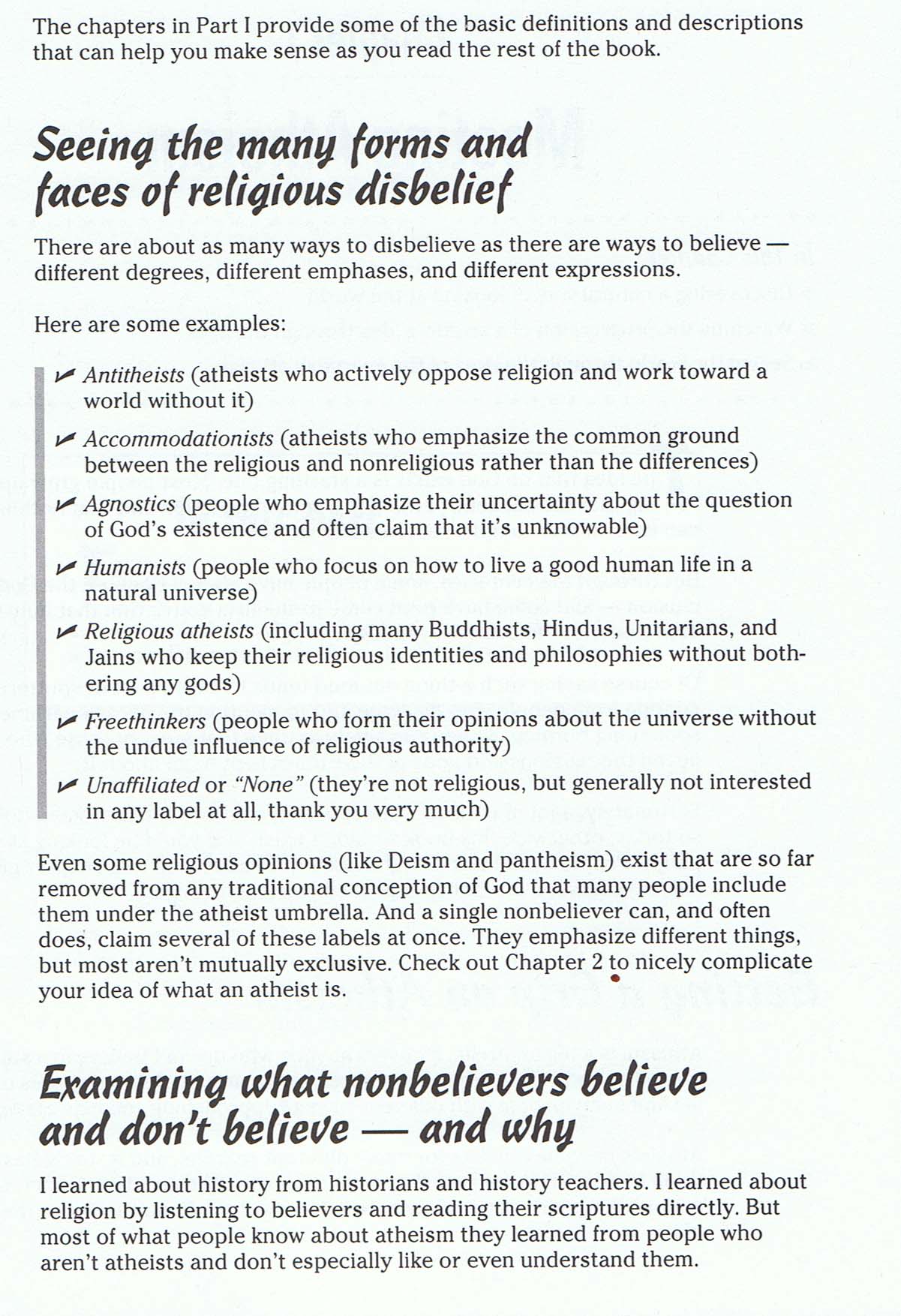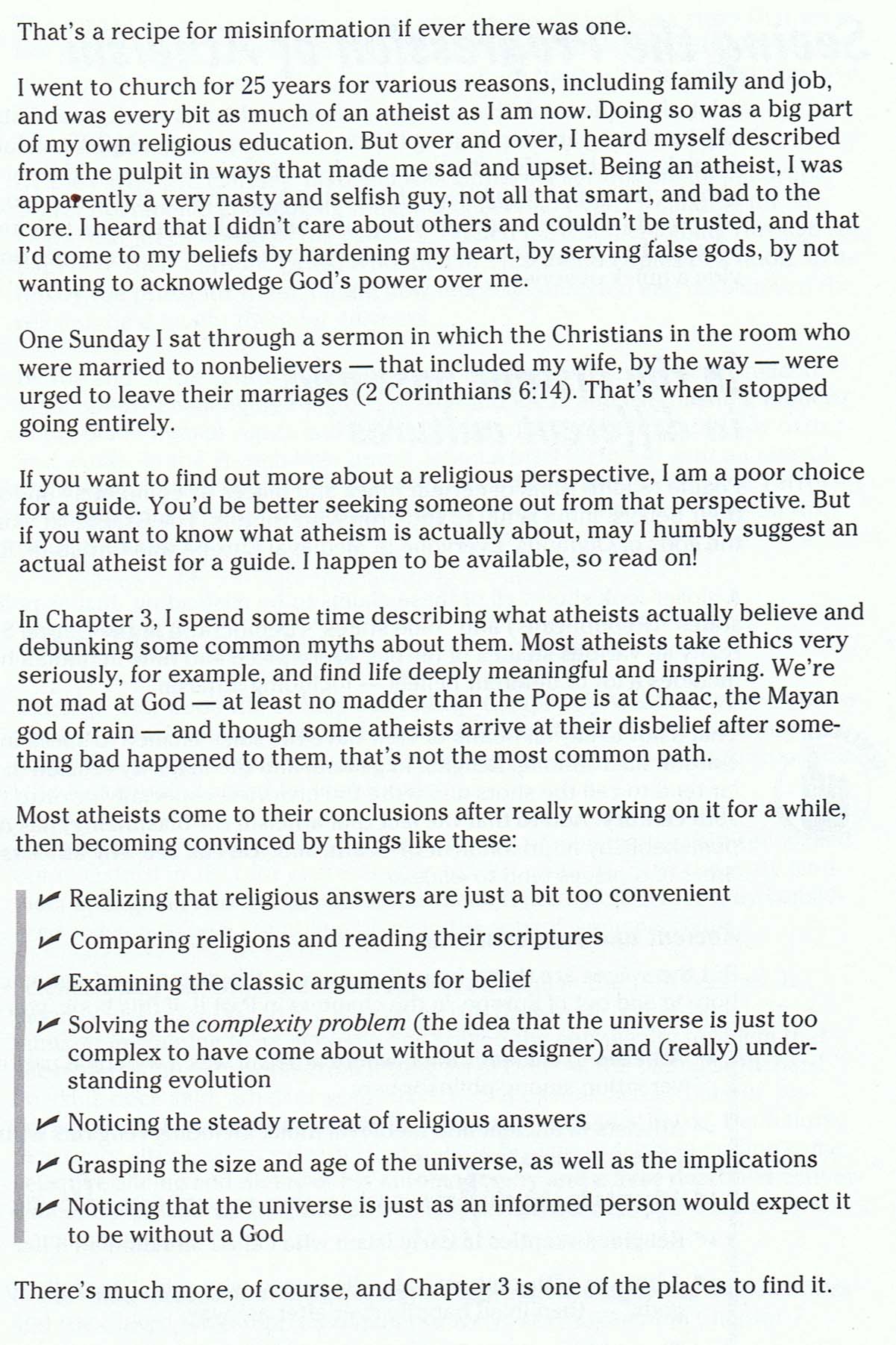Atheism For Dummies
Dale McGowan


Roberts Rule:
We are all atheists. I just believe in one fewer god than you do. When you understand why you dismiss other possible gods, you will understand why I dismiss yours. (Stephen Roberts 1995)
Bertrand Russell's idea that should hold all opinions conditionally (Capable of being changed) rather than dogmatically (writ in stone), ie should end every statement of opinion with words "Of course I might be wrong." Russell wanted to make it clear that he was agnostic (in that not enough evidence to disprove) the existence of any god - Zeus, Apollo or Christian God. And he came up with idea of a tiny teacup orbiting Sun between Earth and Mars. Can't definitively prove that it's not there, but it is so unlikely that we can ignore the possibility. And the likelihood of the Christian God is the same.

Bertrand Russell also talked about the difference between the will to believe and the will to find out, which are opposites. Move from one to the other because humans are curious, and we ask questions. Children go through the same process with Santa Claus. Start out with unquestioning belief, then a few questions but accept any ridiculous answer from parents, then eventually all come to realize that Santa is a made up fiction.
One of the most common "aha!" moments for atheists is their first exposure to a religion which is not the one in which they were raised - not a two dimensional snapshot of another religion, but the real deal. Meeting a fully developed system of thought, with its own gods, its own stories and its own claims - one that deeply contradicts their own religion and is held to be absolutely true by millions of people and absolutely false by everyone else - is an eye-opening moment. And many of those people come to the conclusion that both systems are simply ancient attempts to explain the world and comfort human fears before there were better ways of doing so.
Greeks and Romans had their elaborate mythology of gods and goddesses, earnestly believed by the whole civilization, then discarded a few generations later.
Although the claims made in the Bible stretch belief, the supposed answers are very shallow. Invariably come down to "I know it must be true because I feel it in my heart." When pushed into a corner, even the best thinkers shrug and say "You just have to make a 'leap of faith'".
Argument from Complexity: "surely something as complex as a human being could arise by random chance". (whirlwind through a junkyard producing a 747 argument). But doesn't work by random chance.
# All organisms have individual differences
# Most of these differences don't matter. A few are negative, and make it harder to live long enough to have children. A few are helpful, and make it easier to live longer and have more children.
# Those with the helpful difference will have slightly more children, and pass the advantage on to them. This is natural selection.
# The children with the advantage continue to have more offspring, and some of them have another difference which gives a greater advantage.
# Over millions of years, these millions of selected traits produce the incredible diversity and complexity of life today.
One of minor problems christians who accept evo have, is the human soul. If believe that only humans have a soul, but not animals, then God must have chosen a moment in history when humans were "human enough" to have a soul. So there would be a generation of children who had a soul, but their parents didn't.
Is the scientific method compatible with the religious method of learning about the world? If we're talking about traditional revealed religion, which takes the word of prophets and scriptures as final, then No. You can either declare a revelation infallible or pursue science, but you can't do both.
Don't confuse atheism with moral nihilism - the idea that nothing is inherently right or wrong. Most atheists and theists agee that they want to live in a world where people treat each other fairly and don't harm one another.
Almost every traditional religion puts women in an inferior role to men. Nearly all bar women from serving as clergy. Women were (and often still are) held responsible for humanity's fall from grace in the OT, told to stay silent and submissive in church in the NT, and relegated to the servant's role in the Koran. Hinduism instructs women to worship men as gods, even if the husbands lack any morals. Even Jainism has one of its two main sects saying that women cannot achieve nirvana without first being reborn as a man.
Bizarre reaction to Sept 11. People all over America responded to an act of religious insanity by dropping to their knees in prayer. prominent evangelists even blamed atheists for the attack, suggesting that it was God's revenge for the secularizing of America. Yet the attack would not have happened without religion.
Mark Twain asked what sort of a benevolent god would create a fly, sent into the world to spread disease and death.
Sam Harris The End of faith argues that beliefs have inevitable consequences, and that mutually exclusive belief systems lead inevitably to conflict and violence. The only solution is for people to set aside irrational beliefs and make decisions on the basis of rational thought.
Richard Dawkins The God Delusion defines a delusion as a belief held despite clear and compelling evidence against it. Why its important to challenge religion: In addition to whatever good it does, religion has also caused some serious harm. The harm includes active obstruction of the good, including contraception, stem cell research, women's rights, civil rights and science education. Because religion causes many people to abdicate their moral decision making to religious scripture, which is steeped in Bronze Age ideas. Because it leads people to be satisfied with not understanding the world.
Christopher Hitchens God Is Not Great - the God described in the Bible is a contemptible figure, and religion poisons everything it touches. It is violent, irrational and intolerant; it supports and defends racism, tribalism and bigotry, promotes ignorance and is hostile to open questioning.
When asked why he attacks Christians, and why can't he just leave everyone to believe whatever they want, he answers that he would be happy to, if Christians would stop trying to impose their beliefs on others in politics and education.
More books on Religion
ee
Books by Title
Books by Author
Books by Topic